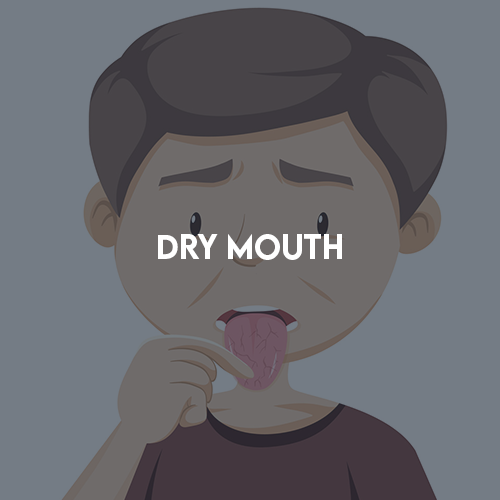DRY MOUTH
One of the most important factors in moistening, grinding food and cleaning in the mouth is saliva secretion. Saliva also controls bacteria and fungi in the mouth and is an important component of oral health. The feeling of dryness in the person’s mouth and difficulty in swallowing is called dry mouth, i.e. “xerostomia”. Xerostomia is caused by the salivary glands not producing enough saliva. Dry mouth can also cause problems such as dryness in the throat, bad breath and chapped lips. Because of some of the health problems that can lead to dry mouth, caution is needed and the cause should be found. Fortunately, there are many effective treatments for dry mouth.
CAUSES OF DRY MOUTH
- It can be seen as a side effect and symptom of certain diseases and infections. Dry mouth can be observed as a symptom of diseases such as Sjögren’s syndrome, Hodgkin’s disease, HIV/AIDS, type 1 diabetes, thyroid disease, Alzheimer’s disease, anaemia, joint inflammation, tuberculosis, Parkinson’s disease, stroke and mumps, systemic lupus erythematosus, anorexia nervosa, sialolithiasis, Bell’s palsy , cystic fibrosis.
- The side effects of some medicines can cause dry mouth.
Anticholinergics, anticonvulsants, antidepressants, antiemetics, antihypertensives, antiepileptics, diuretics, bronchodilators, chemotherapeutics, muscle relaxants and sedatives can cause dry mouth. In addition, taking several medications is one of the causes of dry mouth.
- Radiation in the head and neck area can lead to dry mouth by affecting the salivary glands. Depending on the radiation exposure, the degree of dryness may also vary.
- Dry mouth can be caused by nerve damage in the head and neck area during an operation or as a result of an accident.
- Conditions that cause dehydration, such as vomiting, diarrhoea, fever, blood loss and excessive sweating, can be the cause of dry mouth.
Conditions such as surgical removal of the salivary glands, smoking, snoring, mouth breathing, stress, hormonal changes (pregnancy), excessive coffee or alcohol consumption, spicy food, anatomical problems (concha enlargement, etc.) can also cause dry mouth.
SYMPTOMS OF DRY MOUTH
- Bad breath
- A sticky dry feeling in the mouth
- Frequent thirst
- Abnormal taste sensation, like a metallic taste in the mouth
- Sores in the mouth in the form of aphthae
- Cracked lips
- Dryness in the throat
- Burning or tingling in the mouth and especially on the tongue
- Dry and red tongue
- Difficulty in wearing dentures
- Difficulty chewing, tasting and swallowing
- Hoarseness of the voice
- Speech problems
- Fungal growth in the mouth
- Gum inflammation
- Increase in tooth decay
- Enlargement of the salivary glands

DRY MOUTH TREATMENTS
- If a medication taken causes dry mouth, different medication alternatives can be tried or the dosage of the medication can be changed in consultation with the necessary doctor.
- If the condition causing dry mouth is discovered, eliminating it may also allow dry mouth to be treated.
- Mouthwash, gel and spray can be used to restore moisture in the mouth.
- Drink water frequently to make swallowing easier.
- Methods that increase salivary secretion such as sucking sugar-free lozenge, chewing sugar-free gum, using artificial saliva medication can be tried.
- To ensure effective oral care, teeth should be brushed with fluoride toothpaste.
- Avoiding drinks containing alcohol and caffeine, stopping tobacco use and limiting salt and sugar consumption during the day will also reduce the degree of dry mouth.
- Creams rich in vitamin E can be used to relieve lip dryness.
- Placing a glass of water next to the bed and drinking this water when waking up at night with dry mouth, making sure that the mouth rinses used before going to bed do not contain alcohol, breathing through the nose as much as possible before going to bed with a steam device to humidify the airflow in the room can be recommended to patients with dry mouth, especially at night.
- If these methods do not provide sufficient relief, medication can be prescribed by the doctor or dentist to improve the work of the salivary glands.
Given that long-term dry mouth can cause tooth decay and gum disease, and the possibility of underlying systemic disease, it is necessary to address the problem of dry mouth and seek treatment. Regardless of the cause of dry mouth, applications such as brushing and flossing should be performed during and before treatment to maintain oral health. It should be used preventively against tooth loss or gum disease that may occur as a result of this problem. To protect oral health, a dentist should be visited at least 2 times a year.
We wish you healthy days



